Rediscover Your Beautiful Smile with Our Dentures
Simple, Elegant Solutions for Missing Teeth
Why Choose Scott Kupetz, D.M.D for Botox and Juvederm?
Advanced Technology
We utilize cutting-edge dental technology to create dentures that look natural and fit comfortably.
Personalized Care
We understand that every patient is unique, so we offer personalized care and treatment plans.
Denture Implants
Experience the stability and confidence of denture implants for a worry-free smile.
Affordable Options
We work with you to find denture solutions that fit your budget without compromising quality. Discover the elegance of modern dentistry at Scott Kupetz, D.M.D. and restore your smile today.
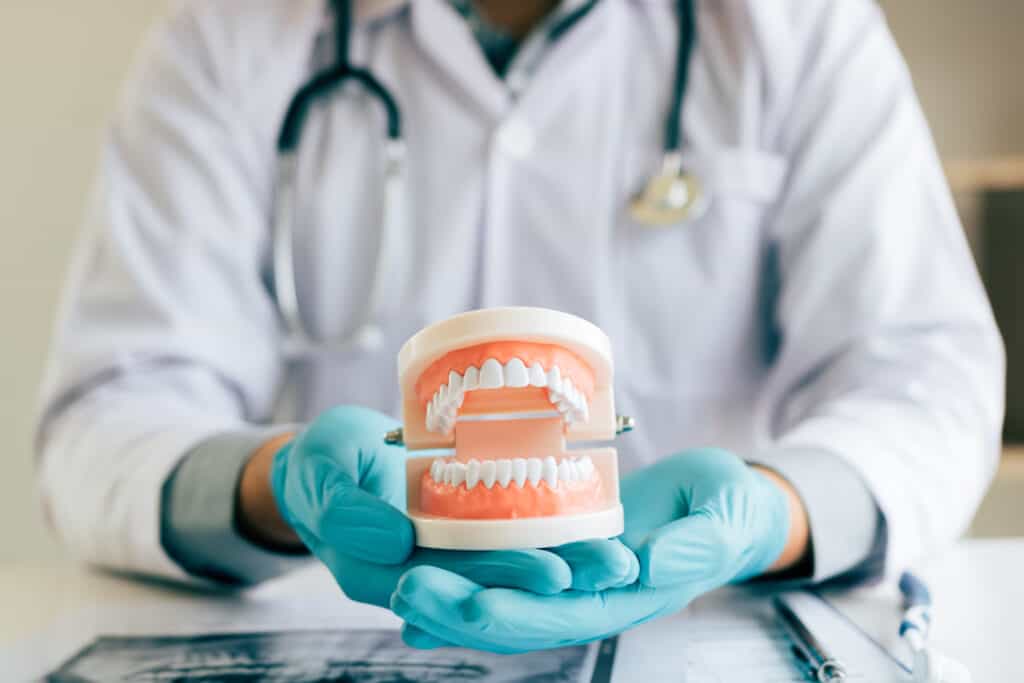
Experienced Denture Specialists
Our team of experienced denture specialists is committed to delivering the best results for your dental needs.
When it comes to Botox, Juvederm, dermal fillers, and other cosmetic treatments, trust Scott Kupetz, D.M.D to help you achieve your aesthetic goals. Your journey to a more youthful and confident you begins here.
The Evolution of Dentures
Dentures have come a long way, evolving into sophisticated dental solutions that replace missing teeth and enhance your facial aesthetics. At Scott Kupetz, D.M.D., we offer modern dentures that provide a seamless blend of comfort, functionality, and natural appearance, just like your natural teeth. Whether you’re in need of full or partial dentures, understanding your options is crucial to making an informed choice for your dental health and confidence.
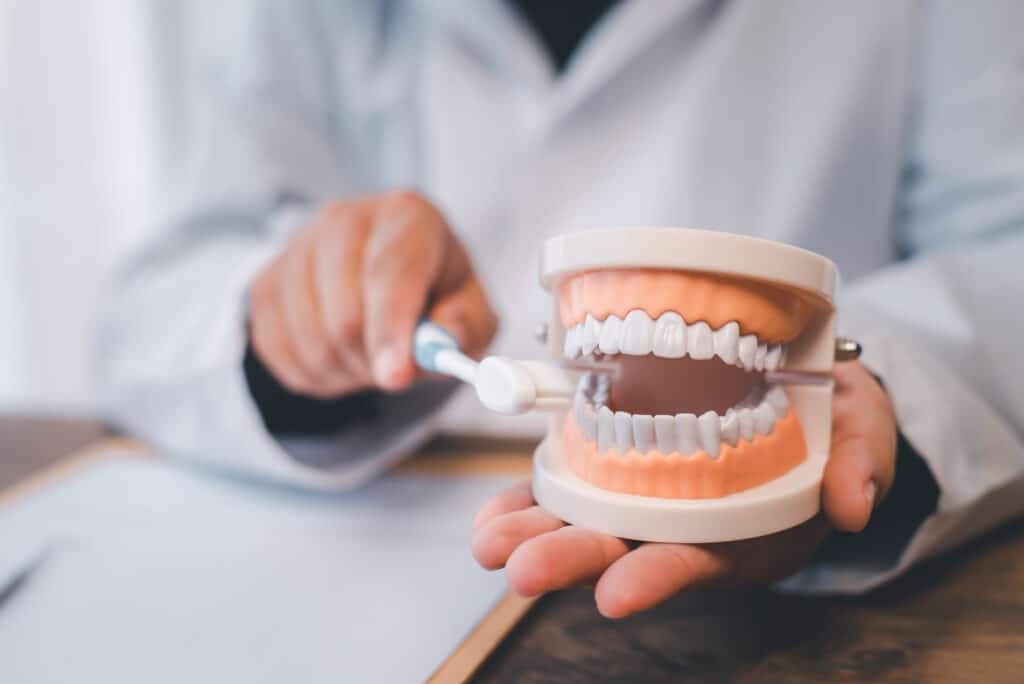

Denture Maintenance, Costs, and Considerations
With time, dentures will require adjustments, rebasing, and realigning to counter everyday wear and potential changes in your mouth’s structure. Proper care is essential to ensure the longevity of your dentures and prevent issues like staining, preserving their natural look and feel similar to your natural teeth. It’s imperative to seek professional intervention for concerns such as looseness or damage. While dentures represent an investment, many insurance plans can significantly mitigate the costs.
At Scott Kupetz, D.M.D., we customize dentures according to budgetary constraints without compromising on quality. We always collaborate closely with our patients to achieve results that align with both aesthetic preferences and functional needs, helping you restore your smile.
Exploring the Types of Dentures
Delve into the diverse range of dentures available at Scott Kupetz, D.M.D., tailored to cater to distinct dental needs, ensuring optimal fit, aesthetics, and functionality for replacement teeth.
Conventional Full Dentures: Offering a comprehensive solution post-tooth extraction, these dentures are introduced once the gums and tissues have healed, generally taking between 8 to 12 months. They provide a complete set of teeth for those experiencing tooth loss.
Immediate Full Dentures: An immediate solution post-tooth extraction, these dentures might necessitate adjustments due to natural changes in gum and bone structure during the healing process. They are a quick way to restore your smile.
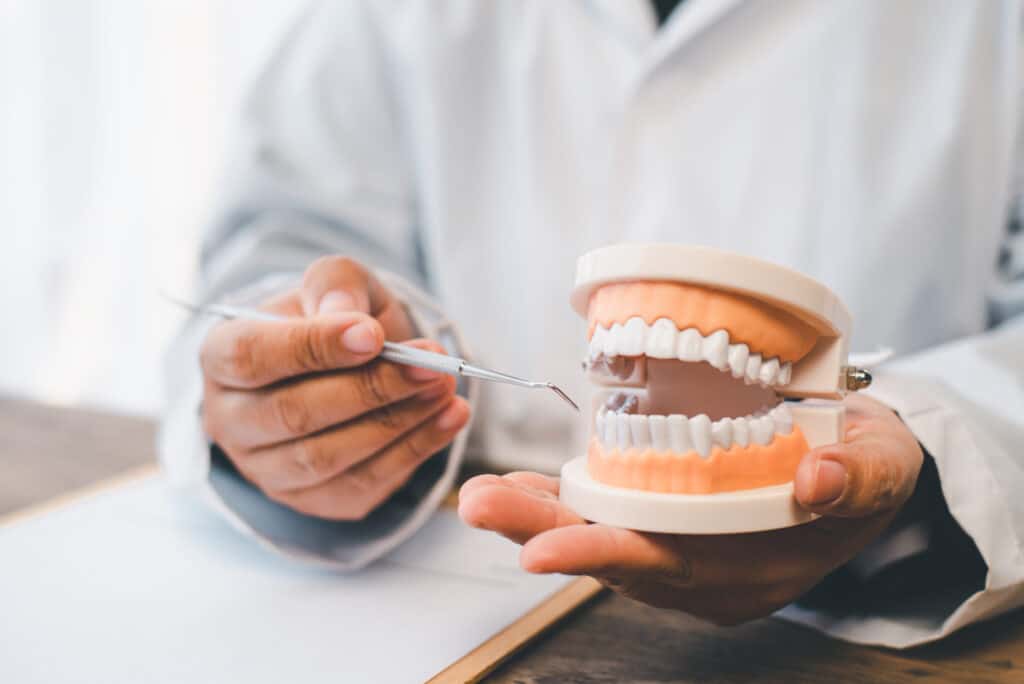
Navigating the Types of Dentures
Delve into the diverse range of dentures available, tailored to cater to distinct dental needs, ensuring optimal fit, aesthetics, and functionality.
Conventional Full Dentures
Offering a comprehensive solution post tooth extraction, these dentures are introduced once the gums and tissues have healed, generally taking between 8 to 12 months.
Immediate Full Dentures
An immediate solution post tooth extraction, these dentures might necessitate adjustments due to natural changes in gum and bone structure during the healing process.

The Flexibility of Partial Dentures
Tailored for those with a few remaining teeth, partial dentures use a gum-colored base and metal framework, ensuring a snug fit and filling gaps left by missing teeth.
Precision Partial Dentures
Offering a refined aesthetic, these dentures use internal attachments, minimizing the visibility of clasps and enhancing the overall natural look.
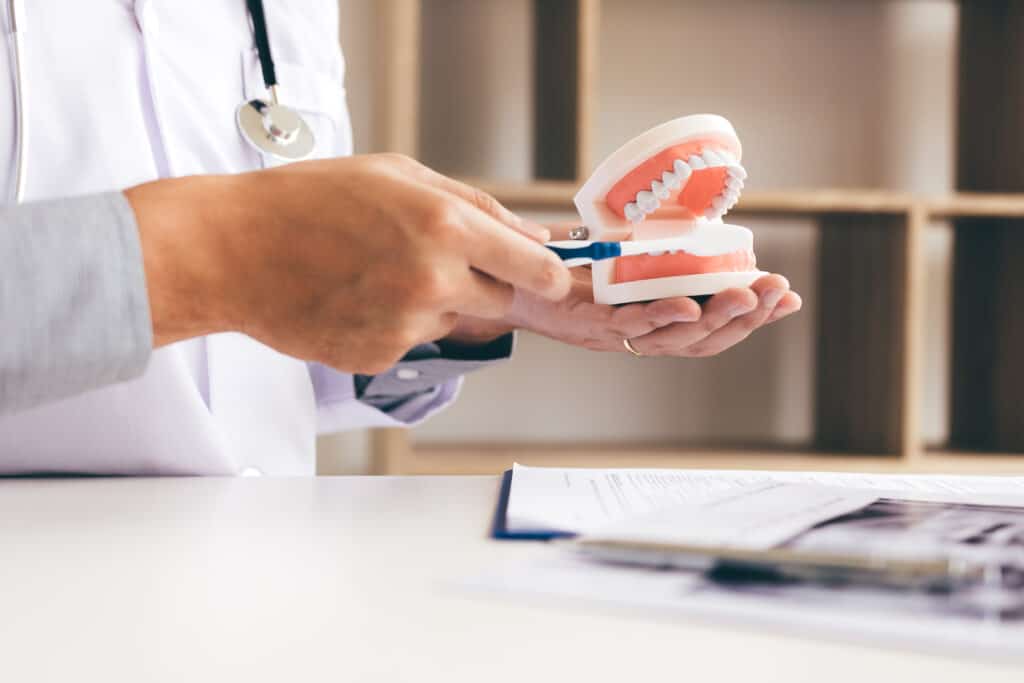
The Flexibility of Partial Dentures
Partial dentures are tailored for those with a few remaining teeth, using a gum-colored base and metal framework to ensure a snug fit and fill gaps left by missing teeth. These partial dentures seamlessly blend in with your natural teeth and are an excellent choice for those who haven’t experienced complete tooth loss.
Precision Partial Dentures
For a refined aesthetic, precision partial dentures at Scott Kupetz, D.M.D. use internal attachments, minimizing the visibility of clasps and enhancing the overall natural look. They are a modern dentistry solution for partial tooth loss.
Denture Implants for Enhanced Stability
Consider denture implants for enhanced stability and confidence in your smile. Denture implants are a revolutionary solution that anchors your dentures securely in place, eliminating concerns about slipping or discomfort. At Scott Kupetz, D.M.D., we offer this advanced option to give you the utmost comfort and peace of mind. Dental implants are a modern dentistry innovation that can restore your smile to its natural beauty.
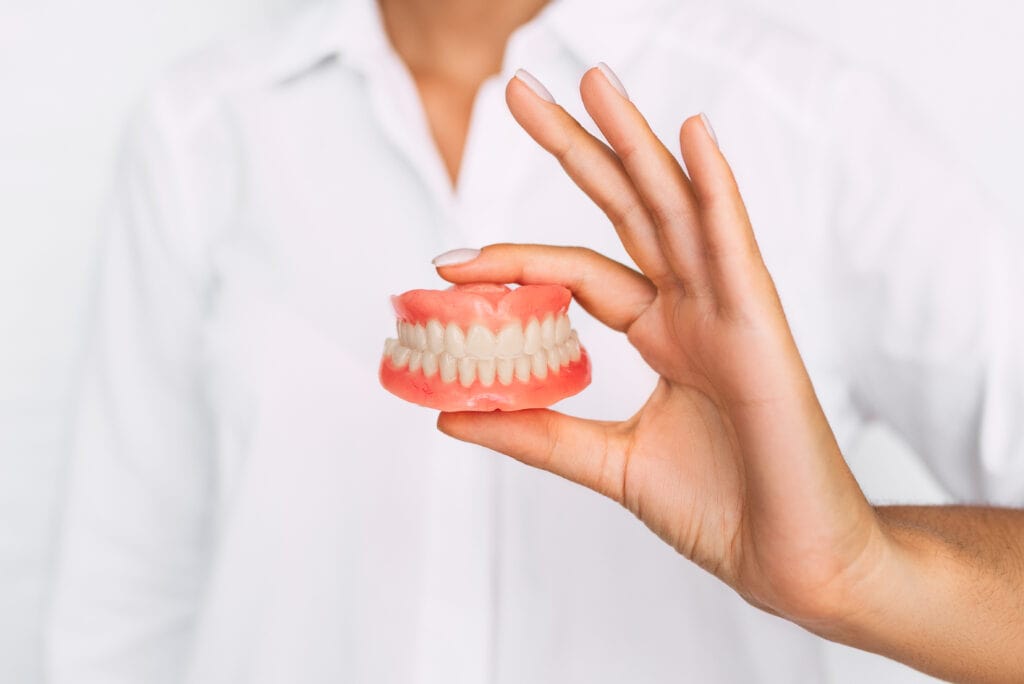

Professional Denture Care at Scott Kupetz, D.M.D.
Our team at Scott Kupetz, D.M.D. is dedicated to providing you with the highest quality dentures and professional denture care, ensuring optimal oral health. We understand that your smile is essential, and we’re here to help you achieve the best results possible. Whether you’re considering denture implants, full dentures, or partial dentures, our experienced team will work closely with you to ensure your dentures are a perfect fit, both aesthetically and functionally. We’re committed to modern dentistry practices that prioritize your comfort and confidence.
ExcellentBased on 44 reviews
 HeatherAugust 8, 2023Extremely thankful to Dr Kupetz and staff for getting me in quickly for my Root Canal.
HeatherAugust 8, 2023Extremely thankful to Dr Kupetz and staff for getting me in quickly for my Root Canal. Olivia RoseNovember 11, 2022Would definitely recommend Dr Kupetz to anyone looking for a new dentist! Called late at night for an emergency appointment and he was able to get me in to his office quickly. Dr. K and his staff were very compassionate and understanding. He’s the best!
Olivia RoseNovember 11, 2022Would definitely recommend Dr Kupetz to anyone looking for a new dentist! Called late at night for an emergency appointment and he was able to get me in to his office quickly. Dr. K and his staff were very compassionate and understanding. He’s the best! EASTERN APPRAISALNovember 7, 2022WHAT AN AMAZING DENTIST.. WENT TO HIS OFFICE WITH NO APPOINTMENT AT THE LAST MINUTE WITH TERRIBLE PAIN FROM A CRACKED TOOTH THAT GOT INFECTED.. HE TOOK ME TO HIS CHAIR RIGHT AWAY AND SAID SIT TIGHT AND WE WILL FIX YOU UP.. WELL HE SURE DID.. AND NOW IM A PATIENT FOR LIFE.. YOU RULE DR SCOTT.. THANKS A MILLION..
EASTERN APPRAISALNovember 7, 2022WHAT AN AMAZING DENTIST.. WENT TO HIS OFFICE WITH NO APPOINTMENT AT THE LAST MINUTE WITH TERRIBLE PAIN FROM A CRACKED TOOTH THAT GOT INFECTED.. HE TOOK ME TO HIS CHAIR RIGHT AWAY AND SAID SIT TIGHT AND WE WILL FIX YOU UP.. WELL HE SURE DID.. AND NOW IM A PATIENT FOR LIFE.. YOU RULE DR SCOTT.. THANKS A MILLION.. Anthon MargilajAugust 7, 2022I went to Dr. Kupetz today, I was in extreme pain. I had a hot tooth, my back right molar, I was loosing my mind it had hurt so bad. I couldn’t sleep for days and it was so infected that my other dentist couldn’t numb it. Scott took his time, made sure it was numb, and actually let me sleep on his chair for a good 30 minutes considering I had been up for nearly 3 days straight. He was attentive, told me stories that made the time pass by, and I was out of there with the first part done in a couple hours. It was really expensive unfortunately, but that’s the insurance industry in the US. We’ll worth every penny. Thank you, sir! Much appreciated.
Anthon MargilajAugust 7, 2022I went to Dr. Kupetz today, I was in extreme pain. I had a hot tooth, my back right molar, I was loosing my mind it had hurt so bad. I couldn’t sleep for days and it was so infected that my other dentist couldn’t numb it. Scott took his time, made sure it was numb, and actually let me sleep on his chair for a good 30 minutes considering I had been up for nearly 3 days straight. He was attentive, told me stories that made the time pass by, and I was out of there with the first part done in a couple hours. It was really expensive unfortunately, but that’s the insurance industry in the US. We’ll worth every penny. Thank you, sir! Much appreciated. Frank CordaroJuly 11, 2022THIS IN MY OPINION IS ONE OF THE BEST DENTISTS YOU WILL EVER NEED. I EXPERIENCED A VERY PAINFULL TOOTH ACHE THIS PAST WEEKEND AND THIS DOCTOR CALLED ME BACK IN 1 MINUTE ON A SUNDAY AFTER HEARING FROM HIS ANSWERING SERVICE NOTIFICATION. I'M NOT A LOVER OF DENTISTS DUE TO PAIN BUT I HAVE NO SECOND GUESSING RETURNING TO HIS PRACTICE. EXPALINED EVERYTHIG HE WAS GOING TO DO AND ANSWERED EVERY QUESTION I ASKED. NOT ONE OUNCE OF PAIN DI I FEEL. MY WIFE AND I ARE NOW FULL TIME CLIENTS. BEST OF ALL I LEFT PAIN FREE.
Frank CordaroJuly 11, 2022THIS IN MY OPINION IS ONE OF THE BEST DENTISTS YOU WILL EVER NEED. I EXPERIENCED A VERY PAINFULL TOOTH ACHE THIS PAST WEEKEND AND THIS DOCTOR CALLED ME BACK IN 1 MINUTE ON A SUNDAY AFTER HEARING FROM HIS ANSWERING SERVICE NOTIFICATION. I'M NOT A LOVER OF DENTISTS DUE TO PAIN BUT I HAVE NO SECOND GUESSING RETURNING TO HIS PRACTICE. EXPALINED EVERYTHIG HE WAS GOING TO DO AND ANSWERED EVERY QUESTION I ASKED. NOT ONE OUNCE OF PAIN DI I FEEL. MY WIFE AND I ARE NOW FULL TIME CLIENTS. BEST OF ALL I LEFT PAIN FREE. Lauren ValentineJuly 4, 2022I was in excruciating pain on a holiday weekend. I took a trip to the ER and had no help. I called around looking for any dentist to see me on a Sunday. Dr. Kupetz made a special trip to the office to see me. Even though I wasn’t a client of his. This man saved me! There was no way I could manage that pain until after the holiday. He was very kind and professional. I enjoyed talking with him as well. His entire facility is the cleanest and most update to date dentist office I’ve ever seen. I ended up needed a root canal and had an abscess. The way that he numbs you, I promise you don’t feel a thing! For such a dreaded and uncomfortable procedure, he made the whole process bearable and truly works with you. I would honestly 100% recommend Dr. Kupetz. I’m very pleased over all with everything he had done for me.
Lauren ValentineJuly 4, 2022I was in excruciating pain on a holiday weekend. I took a trip to the ER and had no help. I called around looking for any dentist to see me on a Sunday. Dr. Kupetz made a special trip to the office to see me. Even though I wasn’t a client of his. This man saved me! There was no way I could manage that pain until after the holiday. He was very kind and professional. I enjoyed talking with him as well. His entire facility is the cleanest and most update to date dentist office I’ve ever seen. I ended up needed a root canal and had an abscess. The way that he numbs you, I promise you don’t feel a thing! For such a dreaded and uncomfortable procedure, he made the whole process bearable and truly works with you. I would honestly 100% recommend Dr. Kupetz. I’m very pleased over all with everything he had done for me. Crissy BullockMay 16, 2022Had the most amazing experience with Dr. Scott and his dental assistant. I came in for an emergency root canal and I have never experienced such amazing and comforting care at a dental office. Dr. Scott and his assistant have AMAZING bedside manner, which eased my uncomfortable feelings immediately. They are also very transparent (which is a major bonus if you have a fear of the dentist). Dr. Scott and his very knowledgeable dental assistant made sure I was comfortable and at ease during the entire procedure. Dr. Scott and his assistant even came in on a Sunday when I expressed I was in excruciating pain! You can tell Dr. Scott and his team really enjoy and care about what they do. Even though emergency dental work isn't covered by my insurance, the pricing is very reasonable for the extensive work he does. I also work very odd hours, so Dr. Scott and his team were able to do a 3 appointment root canal in one visit! Safe to say I found a new dentist! I would give Dr. Scott and his assistant 6 stars if I could!
Crissy BullockMay 16, 2022Had the most amazing experience with Dr. Scott and his dental assistant. I came in for an emergency root canal and I have never experienced such amazing and comforting care at a dental office. Dr. Scott and his assistant have AMAZING bedside manner, which eased my uncomfortable feelings immediately. They are also very transparent (which is a major bonus if you have a fear of the dentist). Dr. Scott and his very knowledgeable dental assistant made sure I was comfortable and at ease during the entire procedure. Dr. Scott and his assistant even came in on a Sunday when I expressed I was in excruciating pain! You can tell Dr. Scott and his team really enjoy and care about what they do. Even though emergency dental work isn't covered by my insurance, the pricing is very reasonable for the extensive work he does. I also work very odd hours, so Dr. Scott and his team were able to do a 3 appointment root canal in one visit! Safe to say I found a new dentist! I would give Dr. Scott and his assistant 6 stars if I could! Jahaira HernandezApril 9, 2022When you have been in dentistry for as long as I have, walking into an office with an emergency can be difficult . Not because of the lack of trust but because of having knowledge of how an emergency exam can save you or even make your situation worst, I have first hand seen both. Friday night I had a dental emergency. I was in excruciating pain, and after calling about 18 different offices I just began to cry. The last number I dialed lead me to an answering service and I really didn’t want to leave another message but I did. Not even 2 minutes later Dr. Scott called me spoke with me about my issues ( 3 broken teeth (loads of pain) and offered me an appointment the following morning. I was relieved and looking forward to the visit. Well that visit didn’t happen, because of reasons with me and not the office. However Dr. Scott excepted the excuse for my absence and re-scheduled me again at my convenience. Here is the good stuff: Once arriving at the office I was impressed immediately at how clean, organized and welcoming his front desk was, she was helping another patient and still managed to turn her attention to me. She gave me a warm smile and asked politely for a moment. Once she was done she quickly had me in the chair. I was in so much discomfort and I was not looking forward to the X-ray I knew I would have to open up for. Once the dental assistant came in she began taking the X-rays she was so gentian and patient with me while also being personable and easy going that I completely forgot about my fear. They worked so quickly and swiftly all the while educating me on every single thing that was being performed. Then Dr. Kupetz came into my exam room, let me just say, I have worked for about 6 different dentist and none of them gave me the vibe that he did. He seemed to be so concerned about my discomfort and trying to figure out the best possible solution to help me. Not only did he write up my treatment plan, but when given to his employee to break it down to me ( she did an amazing job) I had a couple more questions that she felt the doctor would be more suitable to answer. He came in with no issue and answer every single question I had for him and some. We got into the restoration and he went over and beyond for me, if he didn’t have all tools in my mouth I would have had a open jaw of shock at the amount of things he did in the time I was there. I would definitely give him 6 stars out of 5 . I will recommend his office to anyone with an emergency, with a fear of dentist and just as a routine dentist. Coming from the business stand point I feel the exact same way , DONT tell my past employers but he gave them a run for their money lol! Thank you Dr. Kupetz and your whole team! You don’t understand the comfort you gave to my family and, who were so concerned about me weeping like at baby . My entire family will be seeing you soon!t!
Jahaira HernandezApril 9, 2022When you have been in dentistry for as long as I have, walking into an office with an emergency can be difficult . Not because of the lack of trust but because of having knowledge of how an emergency exam can save you or even make your situation worst, I have first hand seen both. Friday night I had a dental emergency. I was in excruciating pain, and after calling about 18 different offices I just began to cry. The last number I dialed lead me to an answering service and I really didn’t want to leave another message but I did. Not even 2 minutes later Dr. Scott called me spoke with me about my issues ( 3 broken teeth (loads of pain) and offered me an appointment the following morning. I was relieved and looking forward to the visit. Well that visit didn’t happen, because of reasons with me and not the office. However Dr. Scott excepted the excuse for my absence and re-scheduled me again at my convenience. Here is the good stuff: Once arriving at the office I was impressed immediately at how clean, organized and welcoming his front desk was, she was helping another patient and still managed to turn her attention to me. She gave me a warm smile and asked politely for a moment. Once she was done she quickly had me in the chair. I was in so much discomfort and I was not looking forward to the X-ray I knew I would have to open up for. Once the dental assistant came in she began taking the X-rays she was so gentian and patient with me while also being personable and easy going that I completely forgot about my fear. They worked so quickly and swiftly all the while educating me on every single thing that was being performed. Then Dr. Kupetz came into my exam room, let me just say, I have worked for about 6 different dentist and none of them gave me the vibe that he did. He seemed to be so concerned about my discomfort and trying to figure out the best possible solution to help me. Not only did he write up my treatment plan, but when given to his employee to break it down to me ( she did an amazing job) I had a couple more questions that she felt the doctor would be more suitable to answer. He came in with no issue and answer every single question I had for him and some. We got into the restoration and he went over and beyond for me, if he didn’t have all tools in my mouth I would have had a open jaw of shock at the amount of things he did in the time I was there. I would definitely give him 6 stars out of 5 . I will recommend his office to anyone with an emergency, with a fear of dentist and just as a routine dentist. Coming from the business stand point I feel the exact same way , DONT tell my past employers but he gave them a run for their money lol! Thank you Dr. Kupetz and your whole team! You don’t understand the comfort you gave to my family and, who were so concerned about me weeping like at baby . My entire family will be seeing you soon!t!
Because Fear Shouldn’t Stop You From Being Beautiful


